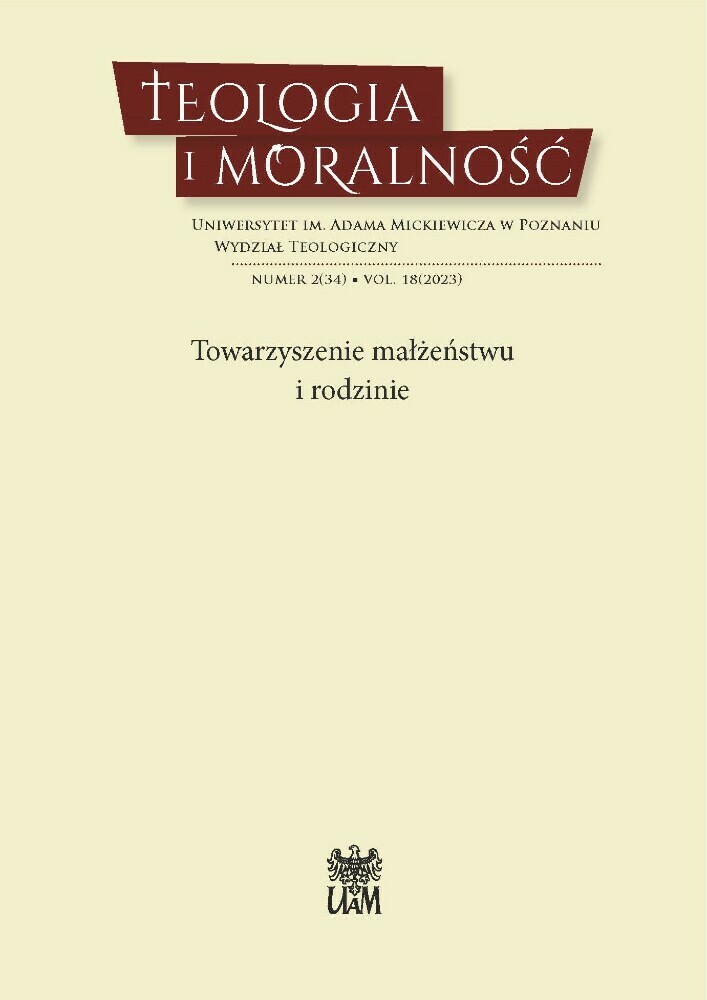Abstract
Over the course of almost half a century of development, in vitro fertilisation techniques have not only become popular and accessible, but have also gained ethical acceptance even in Catholic circles, despite the unequivocally negative assessment of the Church’s Magisterium. The paper addresses the emotional and persuasive arguments of opponents and supporters of this procedure. The serious arguments,revolve around two issues: on the one hand, the fate of embryos that perish in the course of this procedure
and, on the other hand, the separation of the conception of a new person from the parents’ sexual act. These objections have lost none of their relevance and moral weight, which is why Catholic parents, despite the undoubtedly acute suffering that is associated
with infertility, should maintain a critical and distanced outlook on in vitro fertilisation.
References
Amadei, Gianluca et al. 2022. Embryo model completes gastrulation to neurulation and organogenesis Nature 610, 143–153. DOI: https://doi.org/10.1038/s41586-022-05246-3
Bartel, Hieronim. 2016. Embriologia. Warszawa: PZWL.
Brębowicz, Grzegorz H. i Kempiak Joanna. 20014. Ciąża wielopłodowa. W: Położnictwo i ginekologia, podręcznik dla studentów, red. Tadeusz Pisarski, 528-539. Warszawa: PZWL.
Brüsseler Konferenz 2020: Möglichkeiten der Elternschaft für schwule Männer in Europa. Dostęp: 18.12.2020. https://www.menhavingbabies.org/surrogacy-seminars/brussels/deutsch/
Chazan, Bogdan. 2014. Prawo do życia. Bez kompromisu. Rozmawia Maciej Müller. Kraków: WAM
Etica Teologica della Vita. Scrittura, Tradizione, Sfide pratiche., red. Paglia Vincenzo. 2022. Vatican: Libreria Editrice Vaticana [przypis: Etica Teologica della Vita 2022].
Jan Paweł II. 1999. List do Rodzin „Gratissimam sane” (2 II 1994). W: Posoborowe dokumenty Kościoła katolickiego o małżeństwie i rodzinie, red. Kazimierz Lubowicki, 33-103. T. II, Kraków: Wyd. M [przypis: Jan Paweł II 1994].
Kampowski, Stephan. 2014. Children of desire: The technological control of fertility Humanum. Issues in Family, Culture & Science, 2. Dostęp: 9.03.2023. https://humanumreview.com/uploads/pdfs/children-of-desire-the-technological-control-of-fertility.pdf
Kobyliński, Andrzej. 2015a. Argumentacja filozoficzna w sporze o sztuczne zapłodnienie we Włoszech w latach 2004-2014, Studia Ecologiae et Bioethicae, 2(13), 69-91. DOI: https://doi.org/10.21697/seb.2015.13.2.04
Kobyliński, Andrzej. 2015b. Prymat prawa nad etyką? Nowy etap włoskiego sporu o metodę in vitro. Studia Ecologiae et Bioethicae, 2(13), 45-67. DOI: https://doi.org/10.21697/seb.2015.13.2.03
Kongregacja Nauki Wiary. 1998. Instrukcja o szacunku dla rodzącego się życia ludzkiego i o godności jego przekazywania Donum vitae (22.02.1987).W: W trosce o życie. Dokumenty Kościoła. Red. Krzysztof Szczygieł, 360-385. Tarnów: Biblos [przypis Kongregacja Nauki Wiary 1987].
Krasiński, Józef. 2022. In vitro – nauczanie do przemyślenia. Więź, 690 (4), 127-143.
Machinek, Marian. 2007. Spór o status ludzkiego embrionu. Olsztyn: Wydawnictwo UWM.
Maio, Giovanni. 2017. Mittelpunkt Mensch. Lehrbuch der Ethik in der Medizin. Stuttgart: Schattauer.
Mariański, Janusz. 2023. Nowe problemy bioetyczne w narracji społecznej. Lublin: Akademia ANSiM.
More than 8 million babies born from IVF since the world's first in 1978. Dostęp: 9.03.2023.
https://www.eshre.eu/Annual-Meeting/Barcelona-2018/ESHRE-2018-Press-releases/De-Geyter
Muszala, Andrzej. 2009. Embrion ludzki w starożytnej refleksji teologicznej. Kraków: WAM.
Müller, Gerhard Ludwig i Stephan Kampowski. 2022. Going beyond the letter of the law. The pontifical academy for life challenges the teachings of Humanae vitae and Donum vitae. First Things, 8 (27). Dostęp: 9.03.2023. https://www.firstthings.com/web-exclusives/2022/08/going-beyond-the-letter-of-the-law
Rager, Günter. 2006. Die Person. Wege zu ihrem Verständnis. Freiburg–Wien: Herder.
Rager, Günter. 2017. Mensch sein. Grundzüge einer interdisziplinären Anthropologie. Freiburg–München: Karl Aber. DOI: https://doi.org/10.5771/9783495813836
Salij, Jacek. 2017. Teologiczna ocena zapłodnienia in vitro. W: Wobec in vitro. Genetyczne, moralne, filozoficzne, teologiczne i prawne aspekty zapłodnienia pozaustrojowego. Red. Jacek Grzybowski i Franciszek Longchamps de Bérier, 207-227. Kielce: Jedność.
Sgreccia, Elio. 2012. Personalist bioethics. Foundations and Applications. tłum. John A. Di Camillo i Michael J. Miller. Philadelphia: NSBC.
Sobór Watykański II. 1965. Konstytucja duszpasterska o Kościele w świecie współczesnym „Gaudium et spes”. W: Sobór Watykański II, Konstytucje – Dekrety – Deklaracje,830-987. Poznań: Pallotinum. [skrót ]Sobór Watykański II 1965].
Ustawa o leczeniu niepłodności z dnia 25 czerwca 2015 r. (Dz.U. 2015 poz. 1087) [skrót Ustawa 2015].
License
Copyright (c) 2023 Marian Machinek

This work is licensed under a Creative Commons Attribution-NoDerivatives 4.0 International License.

